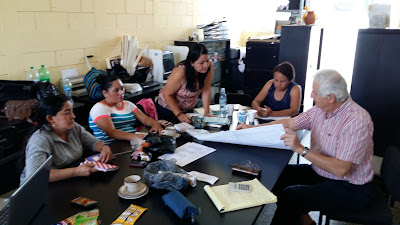Marketing Peanuts in Guatemala
by Robert Bond, F2F volunteer to Guatemala
Guatemala possesses a rich and distinct culture, characterized by a fusion of Spanish and indigenous (Mayan) influences, seen in its colorful handicraft markets and regional costumes. However, it is also a predominantly poor country, and the most populous in Central America, with a GDP per capita roughly half of the average for Latin America and the Caribbean; its agricultural sector accounts for nearly 1/3 of the labor force (Source: CIA World Factbook).
My recent trip to Guatemala in April 2016 was my 27th volunteer F2F project over the past 15 years, and my first to the country. With a sales and marketing background rather than farming, I was delighted by the opportunity to help strengthen horticulture value chains in order to stimulate productivity of small and medium scale farmers, and improve income and living standards for them, their families, and their communities in Guatemala.
 The name Farmer-to-Farmer is actually somewhat of a misnomer, however, as the program provides technical assistance to agribusinesses at many levels, including distribution and marketing. My hosts were the 30 women entrepreneurs of the Union Hope Women’s Group (Grupo Union Esperanza) from the village of Buenos Aires, in the municipality of Santa Ana Huista, Department of Huehuetenango, in the northwest of the country, who have been processing locally-grown peanuts into packaged fried, salted, sweet, and spicy varieties for 10 years.
The name Farmer-to-Farmer is actually somewhat of a misnomer, however, as the program provides technical assistance to agribusinesses at many levels, including distribution and marketing. My hosts were the 30 women entrepreneurs of the Union Hope Women’s Group (Grupo Union Esperanza) from the village of Buenos Aires, in the municipality of Santa Ana Huista, Department of Huehuetenango, in the northwest of the country, who have been processing locally-grown peanuts into packaged fried, salted, sweet, and spicy varieties for 10 years.
Although I was not directly working with farmers on this project, if the Women’s Group business succeeds, local farmers will also benefit, and the women will increase their incomes and help strengthen the economy of their community as well. At presentations and workshops we covered how to do market research and how to enter new markets. In addition, we constructed and discussed their own P&L (profit and loss) statement, discussed customer sales record-keeping, route-to-market, and after some classroom practice, we conducted actual in-market selling.
It was very gratifying for me to witness actual selling taking place by members of the Women’s Group in the stores in Huehuetenango, extolling the Group’s mission and the products’ benefits, just as we practiced in the classroom.
This combination of classroom training sessions on marketing information and decision-making with actual in-field market research, and in this case, making actual sales calls, will help achieve the overall objective to build the Group’s capacity to support the profitable marketing of the peanut products as well as to improve the entrepreneurial skills of Group members. F2F projects like this one are a great use of retired people. The quid pro quo is that you’ve helped some folks and spread goodwill, and hopefully they will benefit.
 |
| F2F volunteer Robert Bond working with members of Grupo Union Esperanza |
My recent trip to Guatemala in April 2016 was my 27th volunteer F2F project over the past 15 years, and my first to the country. With a sales and marketing background rather than farming, I was delighted by the opportunity to help strengthen horticulture value chains in order to stimulate productivity of small and medium scale farmers, and improve income and living standards for them, their families, and their communities in Guatemala.
 The name Farmer-to-Farmer is actually somewhat of a misnomer, however, as the program provides technical assistance to agribusinesses at many levels, including distribution and marketing. My hosts were the 30 women entrepreneurs of the Union Hope Women’s Group (Grupo Union Esperanza) from the village of Buenos Aires, in the municipality of Santa Ana Huista, Department of Huehuetenango, in the northwest of the country, who have been processing locally-grown peanuts into packaged fried, salted, sweet, and spicy varieties for 10 years.
The name Farmer-to-Farmer is actually somewhat of a misnomer, however, as the program provides technical assistance to agribusinesses at many levels, including distribution and marketing. My hosts were the 30 women entrepreneurs of the Union Hope Women’s Group (Grupo Union Esperanza) from the village of Buenos Aires, in the municipality of Santa Ana Huista, Department of Huehuetenango, in the northwest of the country, who have been processing locally-grown peanuts into packaged fried, salted, sweet, and spicy varieties for 10 years.Although I was not directly working with farmers on this project, if the Women’s Group business succeeds, local farmers will also benefit, and the women will increase their incomes and help strengthen the economy of their community as well. At presentations and workshops we covered how to do market research and how to enter new markets. In addition, we constructed and discussed their own P&L (profit and loss) statement, discussed customer sales record-keeping, route-to-market, and after some classroom practice, we conducted actual in-market selling.
 |
| F2F Country Coordinator Jose Cano (left), members of Grupo Union Esperanza (middle), and Robert Bond (right) |
This combination of classroom training sessions on marketing information and decision-making with actual in-field market research, and in this case, making actual sales calls, will help achieve the overall objective to build the Group’s capacity to support the profitable marketing of the peanut products as well as to improve the entrepreneurial skills of Group members. F2F projects like this one are a great use of retired people. The quid pro quo is that you’ve helped some folks and spread goodwill, and hopefully they will benefit.

.png)

Comments
Post a Comment